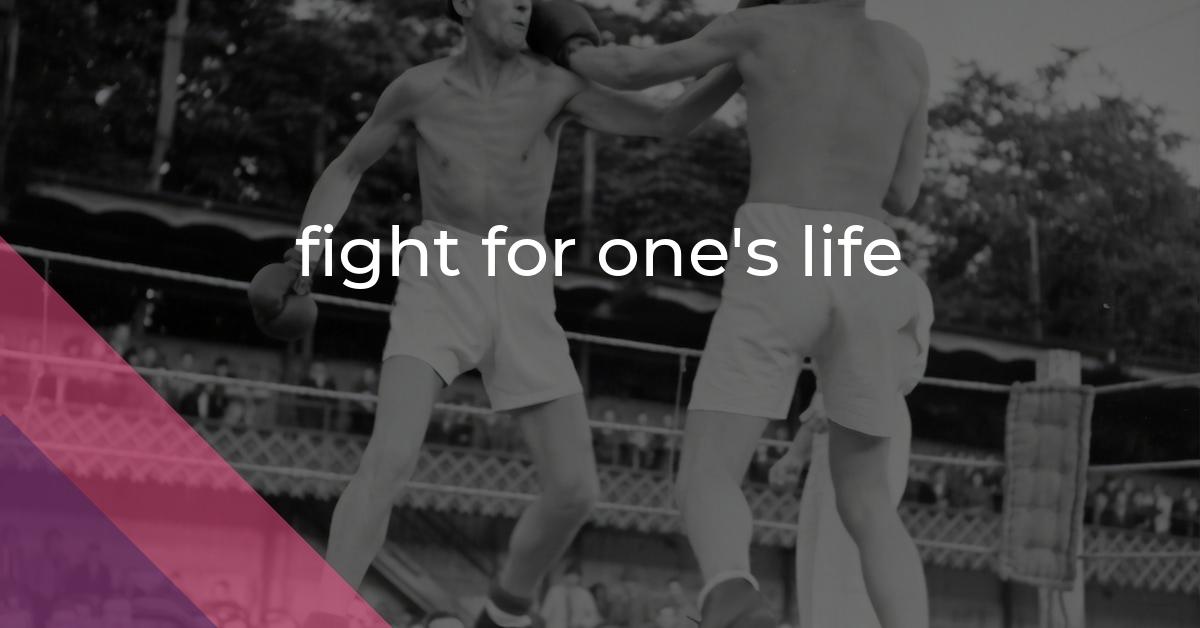fight for one’s life: Idiom Meaning and Origin
What does ‘fight for one's life’ mean?
The idiom "fight for one's life" means to struggle with all one's effort and determination to survive or overcome a life-threatening situation or serious challenge.

Idiom Explorer
The idiom "keep one's head above water" means to be able to survive, manage, or cope with a difficult situation, often with great effort. It implies staying afloat or not sinking in challenging circumstances.
The idiom "in for the kill" is used to describe a situation where someone is determined to achieve their goal and will do whatever it takes to succeed.
The idiom "hold one's own" means to be able to compete or perform adequately in a given situation, often against strong opponents or in challenging circumstances.
The idiom "hang tough" means to persevere or remain determined in difficult or challenging situations. It conveys the idea of not giving up or wavering in the face of adversity.
The idiom "go for the throat" means to attack or confront someone in a ruthless or determined manner, aiming to cause serious harm or defeat them completely.
The idiom "get it how one lives" means to do whatever is necessary or to go to great lengths to obtain something, often with a sense of determination or resilience.
The idiom "for one's life" means doing something urgently or desperately to avoid harm, danger, or death.
The idiom "for all one is worth" means to do something with all of one's ability or effort, often in a desperate or determined manner.
The idiom "fight one's corner" means to defend oneself or stand up for one's own beliefs, ideas, or rights, especially when facing opposition or criticism.
The Ultimate Struggle
The idiom "fight for one's life" is often used to describe a situation in which someone is in a desperate struggle to survive. This expression emphasizes the gravity of the situation and the importance of self-preservation. It conveys a sense of urgency and intensity, highlighting the high stakes involved in such circumstances.
When someone is fighting for their life, they are engaged in a physical or metaphorical battle to defend themselves or their existence. This idiom is commonly used in situations that involve a threatening or life-threatening circumstance, such as medical emergencies, natural disasters, or personal conflicts where physical harm is a possibility.
When faced with a significant threat or danger, individuals fight with all their strength to preserve their own life. This intense struggle reflects the universal human desire to survive and protect oneself. It taps into primal instincts and draws upon the innate will to persevere in the face of adversity.
The idiom "fight for one's life" encapsulates the tenacity of the human spirit in the face of life-or-death situations. It serves as a reminder of the fragility of life and the strength that can be found within us when we are put in desperate situations. This idiom resonates with individuals on a deep, instinctual level as it reflects our primal instincts and the will to fight against all odds.
Another related idiom is "fight one's corner." This expression refers to advocating for oneself or defending one's position or beliefs in a challenging situation. It implies standing up for oneself and not backing down in the face of opposition.
Similarly, "fight a losing battle" is an idiom that describes a situation in which someone is persistently trying to achieve something despite having little chance of success. This phrase conveys a sense of futility and the understanding that the odds are stacked against the person.
The idiom "do-or-die" is another expression related to the concept of fighting for one's life. This phrase is used to describe a situation in which someone must succeed or face severe consequences. It emphasizes the critical nature of the situation and the need for unwavering determination and effort.
When individuals find themselves in a position where they must fight for their life, they often have to fight not only for their physical survival but also for their beliefs, principles, and goals. They must advocate for themselves and defend what they believe in, even if the odds are not in their favor.
However, it is important to recognize that not every battle is worth fighting. Sometimes, despite our best efforts, we may find ourselves in a losing battle. In these situations, it becomes crucial to assess the situation and determine whether it is worth continuing to fight or if it would be more beneficial to pivot and find a new approach.
The idiom "do-or-die" highlights the high stakes nature of certain situations where success is imperative. It implies that there is no room for hesitation or mediocrity, and that one must give their all to achieve the desired outcome. This mindset reflects the determination and resolve required to overcome challenges and fight for one's life.
The idiom "fight for one's life" embodies the desperate struggle to survive in challenging and threatening situations. It captures the urgency, intensity, and universal human desire for self-preservation. Additional idioms such as "fight one's corner," "fight a losing battle," and "do-or-die" further illustrate the various aspects and dimensions of this concept. Whether it is defending oneself, persisting against all odds, or recognizing critical situations, these idioms reflect the resilience and tenacity of the human spirit.
Example usage
Examples of how the idiom "fight for one's life" can be used in a sentence:
- She had to fight for her life when a wild bear attacked her in the forest.
- During the intense surgery, the patient had to fight for his life as the doctors battled to save him.
- The defendant claimed he had to fight for his life when he was attacked by the intruder.
More "Survival" idioms



